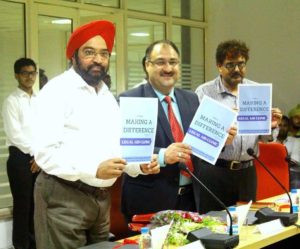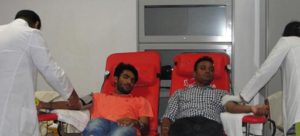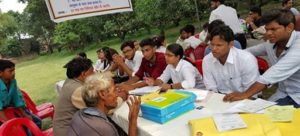By Nitesh Jindal, Dr. Ram Manohar Lohiya National Law University, Lucknow.
Article 39A of the Indian Constitution creates a non-justiciable right against the State to provide free legal aid to the poor people. Despite that the State has not been able to provide access to justice to the downtrodden and marginalised section of the society, which in turn has resulted in one of the most challenging problems for the Indian Government. Keeping all these things in mind, the students of Ram Manohar Lohiya National Law University, Lucknow established the Legal Aid Committee. The Committee was inaugurated by Justice Dr. Arijit Pasayat, Judge, Supreme Court of India, and Chairman of the Supreme Court Legal Service Committee on 21st Feb, 2009.
This Committee, since its inception has been very active in providing aid to the unaided, in helping the needy, in providing free legal aid to the marginalised sections of the society. It performs various functions, ranging from preventive and remedial functions, to reformative functions. The Committee has been actively involved in undertaking various projects, from running a Legal Aid Clinic and conducting Rural Legal Aid Camps, to managing an Alternative Dispute Resolution (ADR) Cell for the University.
 Legal Aid Clinic: Legal Aid Clinic functions with the help of the Uttar Pradesh State Legal Services Authority (UPSLSA). RMLNLU’s Legal Aid Clinic was inaugurated on 4th September, 2015 by Hon’ble Justice Rakesh Tiwari, Chairperson of UPSLSA. It is run by SLSA authorised Para Legal Volunteers (PLVs), who provide free legal services to the category of people who fall under the ambit of Section 12 of the National Legal Services Authorities Act, 1985. The Legal Aid Clinic’s 1st anniversary celebrations saw the release of their Annual Newsletter (2015-16) and establishment of the Advocates’ Pool. The Advocates’ Pool comprises of alumni of the University and a few other Advocates, practicing at the District Court, Lucknow and Allahabad High Court, Lucknow Bench. The previous Vice-Chancellor of RMLNLU, Prof. Gurdip Singh, has time and again expressed his happiness that the Legal Aid Clinic has been able to expand its reach in a very short span of time.
Legal Aid Clinic: Legal Aid Clinic functions with the help of the Uttar Pradesh State Legal Services Authority (UPSLSA). RMLNLU’s Legal Aid Clinic was inaugurated on 4th September, 2015 by Hon’ble Justice Rakesh Tiwari, Chairperson of UPSLSA. It is run by SLSA authorised Para Legal Volunteers (PLVs), who provide free legal services to the category of people who fall under the ambit of Section 12 of the National Legal Services Authorities Act, 1985. The Legal Aid Clinic’s 1st anniversary celebrations saw the release of their Annual Newsletter (2015-16) and establishment of the Advocates’ Pool. The Advocates’ Pool comprises of alumni of the University and a few other Advocates, practicing at the District Court, Lucknow and Allahabad High Court, Lucknow Bench. The previous Vice-Chancellor of RMLNLU, Prof. Gurdip Singh, has time and again expressed his happiness that the Legal Aid Clinic has been able to expand its reach in a very short span of time.
The Para Legal Volunteers, involved in running the Clinic, are selected through a Para Legal Test. A two weeks long training programme is organised by the Faculty as well as the Secretary of the UPSLSA before the Para Legal Test. Videos of all the sessions are made available on the Clinic’s YouTube page. Training Sessions are based on various laws like Family Law, Procedural Law, Labour Law, etc. Every day, two PLVs sit at the Clinic from 6:00 PM to 8:00 PM. The PLVs also engage in publicity and awareness drives in various parts of Lucknow. The Clinic has also started work towards publishing content biweekly, in one of the Local Daily Newspapers. This project focuses on creating awareness through newspapers and building legal literacy. The Social Media Team of the Clinic runs its own YouTube Channel, named the “Legal Aid Clinic”, which works for providing free access to basic legal concepts to the social media users, who are not from a legal background. The Legal Aid Committee and the Legal Aid Clinic organize a number of programs for making people aware about their rights and duties and the redressal mechanism available to them, under law.
 Blood Donation Camps: It is a remarkable initiative taken up by the LAC on an annual basis. Each year, the camp gets an overwhelming response from the students, teachers, and staff members. More than 300 students take part in this camp and donate blood, in return for which, they receive a credit card, using which, one unit of blood shall be available for them for free, from any government blood bank.
Blood Donation Camps: It is a remarkable initiative taken up by the LAC on an annual basis. Each year, the camp gets an overwhelming response from the students, teachers, and staff members. More than 300 students take part in this camp and donate blood, in return for which, they receive a credit card, using which, one unit of blood shall be available for them for free, from any government blood bank.
 Legal Aid Mela: Aiming to provide justice at doorstep, the LAC organizes a Legal Aid Mela in the villages. This Mela is organised with the goal to create awareness among the villagers, about their rights in general, for e.g., Right to Education, Right to Information, etc. A Legal Aid Desk is also set up in the village, to provide free legal aid and advice to the villagers. The Committee in the long run aims to adopt a village and make it litigation free. The Committee also takes upon itself, the responsibility of providing information regarding various government schemes to the villagers, which they are usually unaware of.
Legal Aid Mela: Aiming to provide justice at doorstep, the LAC organizes a Legal Aid Mela in the villages. This Mela is organised with the goal to create awareness among the villagers, about their rights in general, for e.g., Right to Education, Right to Information, etc. A Legal Aid Desk is also set up in the village, to provide free legal aid and advice to the villagers. The Committee in the long run aims to adopt a village and make it litigation free. The Committee also takes upon itself, the responsibility of providing information regarding various government schemes to the villagers, which they are usually unaware of.
CLINEME: CLINEME stands for “Client Counselling”, “Negotiation”, and “Mediation”. This is an Alternative Dispute Resolution (ADR) Competition (intra-University), organised by the LAC. The Committee undertakes the responsibility of making the students aware about these competitions beforehand by conducting various workshops and orientation classes, so that a student can inculcate better understanding about these concepts, before they go on to participate in any of the aforementioned competitions.
RMLNLU took the first of its kind initiative, to organize an International Conference on Alternative Dispute Resolution; the theme being “The Challenges and Prospects of Arbitration and other forms of ADR in India”. It was once again, the Legal Aid Committee, that undertook the initiative of organizing this Conference, to foster the need for a comprehensive legislative framework for all major forms of the ADR mechanism.
 Legal Aid Camps: Legal Aid Camps are organised by the Committee on an annual basis in a pre-decided village. Cases which fall under the ambit of Section 12 of the Legal Services Authorities Act, 1987, are taken up for consideration; free legal service is provided to all of them. A survey is conducted by the Committee Members and Para Legal Volunteers. Financial Assistance is also provided to those who have been deprived of justice due to their financial conditions.
Legal Aid Camps: Legal Aid Camps are organised by the Committee on an annual basis in a pre-decided village. Cases which fall under the ambit of Section 12 of the Legal Services Authorities Act, 1987, are taken up for consideration; free legal service is provided to all of them. A survey is conducted by the Committee Members and Para Legal Volunteers. Financial Assistance is also provided to those who have been deprived of justice due to their financial conditions.
NGO Collaborations: The Legal Aid Committee has collaborated with two Non-Governmental Organizations (NGO), to impart education to the students. These two NGOs are Swantantra Talim and Chetna.
- Swantantra Talim: This is a Lucknow based NGO, which works towards providing alternate education through innovative means, and confidence building workshops for school-going children of the underprivileged communities.
- Chetna: Chetna is also an NGO based in Lucknow, which runs various centres in slums for Right to Education of children. The Committee has started conducting monthly workshops for Six Centres of Chetna in Lucknow.
Prison Project: According to the National Crime Report Bureau (NCRB) data, approx. two-thirds of prisoners in India are undertrials and in order to fight for their justice, LAC started a prison project, in which students from the University visit the prison (jail) and tell the prisoners about their rights and duties. Students before going there undergo a classroom training, wherein various provisions related to prisoners’ rights are taught to them. The aim of this project is to fight for the justice of prisoners.
LAC Shiksha: This is another initiative of the Committee, focussing on the Right to Education. In furtherance of this initiative, the Committee along with Chetna (an NGO), started a preliminary level field research, for establishing a Right to Education Centre at a basti near the RMLNLU football field.
Nukkad Nataks: People get more attracted to visuals or through perceiving things in the form of a real life experience, in comparison to when something is taught to them in the form of theory. Hence, in order to impart social, economic and legal awareness in the society, the LAC organizes Nukkad Nataks on a regular basis. Turn-up in these Nukkad Nataks has always been very high.
Save Paper and Save Trees: The Committee has taken the responsibility to stop wastage of paper. They started the convention of using one-sided used paper sheets for inter-Committee work and encouraged students to either use both sides for printing of projects or submit soft copies instead.
The Legal Aid Committee is one of the most prestigious Committees in the University and has done remarkable work so far, both inside and outside the University. Effective functioning of a Committee depends on the capabilities of the Committee members and there is no denying the fact that this Committee has brought laurels to the University. Kudos to you guys! Keep up the amazing work!
For your reference:
Section 12 of The Legal Services Authorities Act, 1987:
- Criteria for giving legal services.—Every person who has to file or defend a case shall be entitled to legal services under this Act if that person, is—
(a) a member of a Scheduled Caste or Scheduled Tribe;
(b) a victim of trafficking in human beings or beggar as referred to in Article 23 of the Constitution;
(c) a women or a child; 1[(d) a person with disability as defined in clause (i) of section 2 of the Persons with Disabilities (Equal Opportunities, Protection of Rights and Full Participation) Act, 1995 (1 of 1996);] 1[(d) a person with disability as defined in clause (i) of section 2 of the Persons with Disabilities (Equal Opportunities, Protection of Rights and Full Participation) Act, 1995 (1 of 1996);]
(e) a person under circumstances of undeserved want such as being a victim of a mass disaster, ethnic violence, caste atrocity, flood, drought, earthquake or industrial disaster; or
(f) an industrial workman; or
(g) in custody, including custody in a protective home within the meaning of clause (g) of section 2 of the Immoral Traffic (Prevention) Act, 1956 (104 of 1956) or in a juvenile home within the meaning of clause (j) of section 2 of the Juvenile Justice Act, 1986 (53 of 1986) or in a psychiatric hospital or psychiatric nursing home within the meaning of clause (g) of section 2 of the Mental Health Act, 1987 (14 of 1987); or 2[(h) in receipt of annual income less than rupees nine thousand or such other higher amount as may be prescribed by the State Government, if the case is before a court other than the Supreme Court, and less than rupees twelve thousand or such other higher amount as may be prescribed by the Central Government, if the case is before the Supreme Court.] 2[(h) in receipt of annual income less than rupees nine thousand or such other higher amount as may be prescribed by the State Government, if the case is before a court other than the Supreme Court, and less than rupees twelve thousand or such other higher amount as may be prescribed by the Central Government, if the case is before the Supreme Court.]

